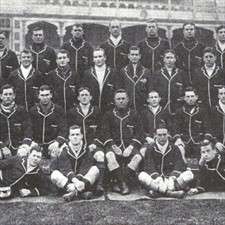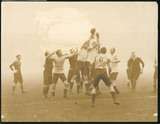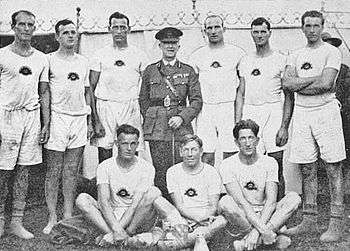Sydney Middleton
 | |||||||||||||||||||||||||||||||||||||
| Birth name | Sydney Albert Middleton[1] | ||||||||||||||||||||||||||||||||||||
|---|---|---|---|---|---|---|---|---|---|---|---|---|---|---|---|---|---|---|---|---|---|---|---|---|---|---|---|---|---|---|---|---|---|---|---|---|---|
| Date of birth | 24 February 1884[1] | ||||||||||||||||||||||||||||||||||||
| Place of birth | Glebe, New South Wales [1] | ||||||||||||||||||||||||||||||||||||
| Date of death | 2 September 1945 (aged 61) | ||||||||||||||||||||||||||||||||||||
| Place of death | Kensington, London [1] | ||||||||||||||||||||||||||||||||||||
| Rugby union career | |||||||||||||||||||||||||||||||||||||
| |||||||||||||||||||||||||||||||||||||
| Olympic medal record | ||
|---|---|---|
| Men's Rugby union | ||
| 1908 London | Team competition | |
Sydney Albert 'Syd' Middleton DSO, OBE (24 February 1884 – 2 September 1945) was an Australian Army officer and national representative rugby union player and rower. He won a gold medal in rugby at the 1908 Summer Olympics and competed in rowing at the 1912 Summer Olympics. He had a distinguished career in World War I being awarded the DSO and later an OBE. He captained the Wallabies in a Test series in 1910. As a rower he was twice an Australian national champion and won the Grand Challenge Cup at the Henley Royal Regatta in 1912. He was a member of the AIF crew which won at the 1919 Peace Regatta and brought the King's Cup to Australia.
Sporting career
Rugby
Middleton commenced his rugby career with the Glebe Rugby Club—the Sydney suburb of his birth. His first representative appearance was for New South Wales in the interstate series against Queensland in 1908 which performance saw him selected for New South Wales against the touring Anglo-Welsh side of 1908. He was in the right place at the right time and was selected in Australia's inaugural national rugby team to tour the northern hemisphere – Dr Paddy Moran's First Wallabies. The tour was a long one—36 matches and Middleton would prove to be a reliable member of the party appearing in 31 of the Wallabies matches. He was the second tallest player in the squad which meant he featured in the Australian line-out. But he was also a robust defender at his physical peak and he was selected in every one of the tour's first eighteen games.[2]

At the time the rugby tournament for the London Olympics game may not have appeared to be of great significance. Australia had already beaten Cornwall, the British county champions early in the tour and Scotland, Ireland and France had all turned down the Rugby Football Union's invitation to participate in the Olympic bouts. Neither the tour captain Moran, nor the vice-captain Fred Wood played, so Middleton's club captain Chris McKivat led the Wallabies to an easy 32–3 victory and to Olympic glory, with each Wallaby in that match thereafter an Olympic gold medallist.

Syd Middleton made his Test debut on that tour at Rectory Field, Blackheath in the Test against England in January 1909. At the tour's end McKivat would lead fourteen of the Wallabies into the professional ranks with the fledgling rugby league code in Sydney, but Middleton was not interested. He stayed loyal to the amateur game and was rewarded in 1910 when he captained New South Wales in matches against the All Blacks and the New Zealand Māori. That year he captained the Australian national side in three Tests against the All Blacks, one of which was won. All told he made 33 national appearances for Australia including four Tests, three as captain.[3]
Rowing
Middleton retired from rugby in 1911 and concentrated on rowing. He had been a member of the Sydney Rowing Club for some time and regularly appeared in the New South Wales state selection eight between 1906 and 1911. He competed the New South Wales men's eights which contested the annual Australian Interstate Regatta in 1906, 1907 and 1910, 1911. Those New South Wales crews were victorious in 1910 and 1911. [4]
In 1912 he was a member of the Australian men's eight which racing as a Sydney Rowing Club entrant, won the Grand Challenge Cup on the River Thames at the Henley Royal Regatta. The eight then moved to Stockholm for the 1912 Summer Olympics, where after beating a Swedish eight in the first round[5] they were beaten by a Great British crew in the second round - the same Leander eight they'd beaten at Henley a few weeks earlier.[6] [7]
War service
He enlisted in the AIF in 1915 as a 2nd-Lieutenant with B Company, 19th Battalion and embarked from Sydney on board HMAT Ceramic on 25 June 1915. He served at Gallipoli and in France.[8] He was promoted to Major, 17th Battalion in May 1917. He was mentioned in despatches in 1918, was awarded the Distinguished Service Order in 1919 for bravery in action and in 1920 he was awarded the Order of the British Empire.
His recommendation for the DSO recorded: "The battalion owes much of its success to the splendid example set by this very fine type of officer. He was in command of the 17th Bttn. on the 14th May 1918 east of Heilly, near Amiens when the enemy made a very determined attack on the front held by the 17th Bttn and the manner in which he handled the situation and quickly restored the line showed great initiative and leadership."
After the armistice Middleton was integrally involved in arranging sporting events for the allied troops prior to their demobilisation. Middleton was a member of the victorious AIF crew at Royal Peace Regatta who won the cup for eight-oared boats which was presented by King George V. In time, the King's Cup, became the trophy presented to the winning men's eight at the annual Australian Rowing Championships.


Middleton wrote from Gallipoli to the sporting journal The Referee:
| “ | There are dozens of footballers of lesser fame and lower grades knocking about. I meet them every day. A man is always taking a bit of a risk here, and there’s plenty of sickness about: but I’m still going strong, and hope to be for some little time yet. I haven’t killed a Turk yet, but they have gone pretty close to me far too often. The damage we do one another in the style of warfare is mainly from shells and bombs, and we never see the results in these cases, but there’s plenty evidence of former willing hand-to-hand goes lying about all round us, far too close to be pleasant if one’s at all delicate.”. | ” |
| — The Referee, 15 December 1915 | ||
Honours and awards
![]()
![]()
![]()
![]()
![]()
- Distinguished Service Order
- Order of the British Empire
- 1914-15 Star
- British War Medal
- Victory Medal
| Preceded by Chris McKivat |
Australian national rugby union captain 1910 |
Succeeded by Ward Prentice |
References
Footnotes
- 1 2 3 4 5 6 7 8 "Scrum.com player profile of Syd Middleton". Scrum.com. Retrieved 12 July 2010.
- ↑ Howell p 46
- ↑ Howell p 47
- ↑ http://www.rowinghistory-aus.info/interstate-championships/1907.php#M8 Guerin-Foster King's Cup History
- ↑ "Rowing at the 1912 Stockholm Summer Games: Men's Coxed Eights Round One". Olympics at Sports-Reference.com. Retrieved 14 January 2018.
- ↑ 1912 Olympics at Guerin Foster
- ↑ "Rowing at the 1912 Stockholm Summer Games: Men's Coxed Eights Quarter-Finals". Olympics at Sports-Reference.com. Retrieved 14 January 2018.
- ↑ Coe, Bruce (2014). "Australasia's 1912 Olympians and the Great War". International Journal for the History of Sport. 31 (18): 2313–2325.
Bibliography
- Collection (1995) Gordon Bray presents The Spirit of Rugby, Harper Collins Publishers Sydney
- Howell, Max (2005) Born to Lead – Wallaby Test Captains, Celebrity Books, Auckland NZ